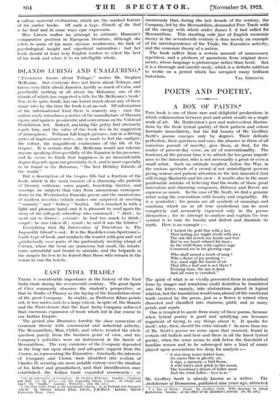EAST INDIA TRADE.t
THERE is considerable importance in the history of the East India trade during the seventeenth century. The great figure of Clive commonly obscures the student's perspective, so that he thinks of Plassey as the laying of the foundation-stone of the great Company. In reality, as Professor Khan points out, it was under, and, to a large extent, in spite of, the Stuarts and the Protectorate that the East India Company achieved that enormous expansion of trade which led in due course to our Indian Empire.
The period also illtstrates forcibly the close connexion of economic theory with commercial and industrial activity. The Mercantilists, Mitn, Childe, and others, treated the whole question purely from the business point of view, and the Company's activities were an instrument in the hands of Mercantilism. The very existence of the Company depended in the long run upon steady and adequate support from the Crown, as representing the Executive. Gradually the interests of Company and Crown were identified (the realism of Charles II. securing one more notable victory over the idealism of his father and grandfather), and, that identification once established, the Indian trade expanded enormously ; so
• (1) By Intervention of Providence. By Stephen McKenna. London : Chapman and Hail, [in. 641. net,]—(2) The Impossible Island, Corsica : its People and Sport. By " Snaffle." London : Witherhy. [10s. Sd. net.] .1 The Ease India Trade in the Seventeenth Century : in its Political and Economic Aspects. 13y Shataat Ahmed Khan, Litt.D., F.B.Ifist.S. London : Oxford ULLitersity Tress. 114s.1 enormously that, during the last decade of the century, the Company, led by the Mercantilists,-demanded Free Trade with all the energy with which under James I. it had called for Mercantilism. This startling voile face of English economic theory in the seventeenth century is thus merely an example of the interdependence of the Trade, the Executive activity, and the economic theory of a nation.
The book suffers from a certain amount of unnecessary repetition, and a plethora of quotations from original docu- ments, whose language is picturesque rather than lucid. But it is a thorough and careful study, which is a definite addition to works on a period which has occupied many brilliant


















































 Previous page
Previous page